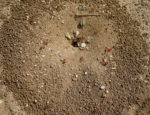Showing 1-2 of 2 results

Private Landowners Guide to Forest Certification in the South
"Private Landowners' Guide to Forest Certification in the South," developed by the LSU Ag Center and Mississippi State University Extension, helps forest landowners understand forest certification.

Cover Crops and Soil Biology: What Do We Know?
Investigating soil biology is a wild, unpredictable zoological ride. From the smallest organisms on Earth (viruses) to earthworms, cover crop selection and management is affected by and influences soil biology in ways we cannot completely predict.